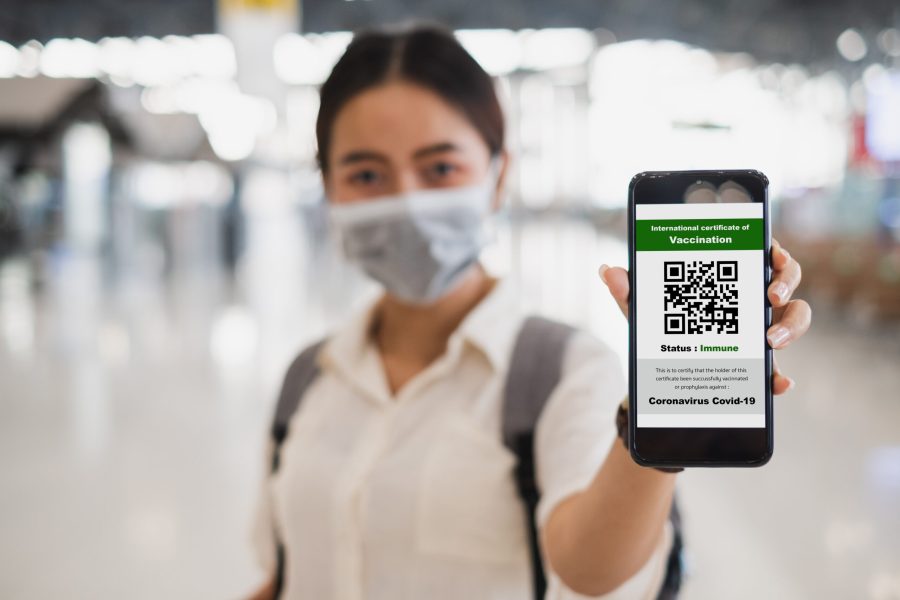The dilemma of opening up: a rapid call for evidence on the issue of vaccine passports and unequal freedoms

Geoff Mulgan
Over the next few months, many countries will face a common and tricky challenge. How do you start to free things up in ways that recognise that some of your population have had the vaccine, or a past COVID-19 infection, and therefore should potentially be treated differently from those who haven’t?
The question started being talked about a year ago. Very soon after the Wuhan outbreak, China introduced a traffic light system on mobile phones to show who had been tested or previously infected. In Europe, suggestions were made for wristbands or certificates, and many expected an EU-wide scheme last summer. Countries such as India, with sophisticated biometric ID systems, looked at how to link vaccination records to these.
But little progress was made in implementing these ideas – partly because of the many practical challenges. Could people be infected more than once? How reliable would vaccines prove to be? How much would have to change if we discover ever-more virulent variants?
Others made ethical arguments, claiming that any arrangements that would give greater freedom to some would be both unequal and unfair. There are precedents: for example, in some countries, children who have not been vaccinated according to the national immunisation calendar (and don’t have clinical exemption) cannot be enrolled into organised care or public schools.
In 2020, there was a strong sense of us all being in this together, as young people had to make severe sacrifices – primarily to protect the elderly. Would that all fall apart if the over-50s got to go on holiday, socialise and party, while the young remained locked up? There’s no doubt that new arrangements giving the vaccinated more freedoms would be unequal: indeed, that’s the whole point. But how unfair would they be?
They would certainly tend to give greater freedoms to the ‘vaccinated old’ rather than the ‘unvaccinated young’, and to some occupations rather than others – for example, nurses over taxi drivers. But is that unfair? Is it really fairer that everyone should suffer and be constrained, rather than just some of the population? And is it really fair or sensible to slow down the process of opening up on ethical rather than health grounds, with all that might mean for jobs and prosperity?
Opinion is fiercely divided on these questions. There are still plenty of practical issues to be resolved, including how to combine reliable proof of vaccines with proof of tests. But governments are coming under pressure to find a solution – not least from the global travel industry, with some companies and countries insisting that holidaymakers must be fully vaccinated before they can travel.
Some people argue that with infection rates low and the vulnerable elderly protected, there’s no need for such passports except for international travel, and that they’d more trouble than they’re worth. Others argue they should be used for big events (rock concerts, festivals, sports) but that pubs and restaurants should be free to decide whether they want to police entry, given the big practical problems of implementation. The credibility of these views is likely to depend very much on the rate of infections, and how frightened we are of new variants.
Whichever side you take on this, you’ll probably agree that whatever is decided as a reasonable way forward should be seen as legitimate and fair. Otherwise, there’s a serious risk of mass disobedience, protests and other problems.
We’re seeking the best-available insights
At the International Public Policy Observatory, we’re interested in pulling together the best-available insights from social sciences and research of all kinds that can help guide these judgments. For example, some would argue that the process of making these decisions is as vital to the legitimacy of the decisions made as their content. Is this true? Would it be wrong for government to make these decisions in the usual way, in departments and Cabinet with approval from parliament? Or do we need citizens’ assemblies (or similar devices) to advise government, rather than just relying on politicians guided by experts? There has been very little discussion of this point in the media so far.
Others might argue that any arrangements will be easier to justify if there is a clear and believable timescale and end-date. Or do any new arrangements need to be presented as a package, so that those losing out most in terms of freedom are clearly winning in other respects – perhaps even one-off grants for young people to compensate for the sacrifices they’ve made?
For example, should young people get a bonus for each month of COVID constraint, such as £10 per month, towards a voucher for use in travel in 2022 – paid for in part from the greater economic activity allowed by giving greater freedom in 2021 to people who have been vaccinated? It wouldn’t be hard to imagine airlines, banks and others contributing additional bonuses to such a scheme, as a symbol of thanks for all the sacrifices young people have made.
These issues are now very live. Getting decisions wrong in the next few weeks could make 2021 a much grimmer year than we had hoped, particularly if vaccine supplies are seriously constrained. If you have ideas on how to answer these questions, ideally based on some evidence rather than just hunch or hope, please let us know at ippo@ucl.ac.uk.
